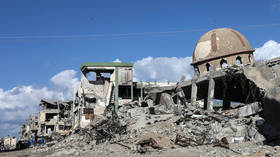Palestinian hunger striker Mohammed Allan, held by Israel without charge, slips into coma
A Palestinian prisoner who has been on hunger strike for the past 60 days has slipped into a coma, his lawyer told RT. Mohammed Allan is being held without charge by Israeli authorities.
Allan's attorney, Jamil el-Khatib, confirmed to RT that his client is "in a medical coma."
Palestinians participate in solidarity sit with Palestinian prisoner Mohammed Allan in front of Soroka hospital pic.twitter.com/KIaCmcuS5h
— QudsNet.ps (@qudsnetnewsagen) August 10, 2015The detainee was transferred to Barzilai Medical Center on Monday after doctors at Soroka hospital in Beersheba refused to force-feed him.
Physicians at Barzilai have also stated they will not force-feed Allan, though hospital medical director Dr. Chezi Levy did not rule out the possibility when speaking to the media this week.
Doctors are currently injecting Allan with supplements essential for survival.
Pickets in support of Allan, who is an Islamic Jihad activist, were held in Beersheba, and in London.
The Israeli military "is on high alert for concern that there could be widespread protests and demonstrations if Mr. Allan's situation either deteriorates, or if Israeli authorities make the decision to force-feed him and this becomes public,” RT's Paula Slier reported from Jerusalem.
Allan's attorney says his client's wish was to continue his hunger strike "because he believes that he is innocent and he is not guilty and he wants to continue until he gets his freedom.”
Father of the hunger striker Mohammed Allan during a press conference today.
#Palestinepic.twitter.com/htJHsvbof3
— Eye on Palestine (@AYAHUMAIDM) August 14, 2015The hunger striker's lawyer earlier told RT that his client is “very frail,” and the process could “kill him.” The head of the Palestinian Prisoner’s Committee, which is helping Allan with his legal position, also says that forcing him to eat could make the situation a lot worse.
“He could die even without the force-feeding. His health is very frail and if this regulation is applied to him, it could kill him. He will endure immense suffering,” Issa Qaraque, head of the Palestinian Prisoner’s Committee, told RT.
Amid Allan, Mohammad’s brother, said he “is in a very bad state,” adding that “force-feeding him would be the equivalent to murdering the prisoner.”
The fears that Allan would be force-fed escalated after the Israeli parliament late last month passed a law allowing authorities to force-feed prisoners on hunger strike.
The law, which passed by a slim margin in July, hasn't been without criticism. Those against the legislation say force-feeding is unethical and akin to torture.
Tell @POTUS (202-456-1111) to demand Israel free comatose Palestinian prisoner and hunger striker Mohammed Allan now. pic.twitter.com/oU2mCqsSYI
— Joe Catron (@jncatron) August 14, 2015Among the critics of the law is the Israeli Medical Association, which is challenging the legislation in the Supreme Court.
"There have been clashes between the IMA and the government [in the past], but never on such basic ethical issues," Raphi Walden, a physician and member of the group Physicians for Human Rights-Israel, told AP.
However, those in favor say the law is needed to deter Palestinian detainees from hunger striking for their release or other demands. They also say that force-feeding is preferable to letting a patient die.
“I think there's a difference in how the medical community behaved and in how our government has behaved and what they wanted. Because if it would have gone the way the government wanted, the doctors would have force-fed him long ago,” Hadas Ziv from Physicians for Human Rights told RT.
Allan has been kept under arrest and in administrative detention – a measure that allows Israel to detain suspects without charge for long periods – since November, despite not having been charged with any offense.
The Israeli group Physicians for Human Rights said the law “pushes the medical community to severely violate medical ethics for political gains, as was done in other dark regimes in history.”
Meanwhile, the UN has labeled hunger strikes a “fundamental human right.”
'Now it's about saving Allan's life'
Despite the Israeli Medical Association refusing to perform force-feeding on Palestinian prisoners, the government will still be able to find doctors to carry out the procedure, Gideon Levy from Israel’s Haaretz newspaper told RT.
“There are always exceptions, like doctors in the prison authority, doctors in the secret services, and other doctors who think differently and might go through this procedure,” he said.
But Levy stressed that it’s too early to talks about force-feeding, as “right now it’s about saving the life of Allan.”
“This will not be through force-feeding because before force-feeding you have to stabilize his situation. And, hopefully, there’s no irreversible damage, because there might be also a danger that he has already a brain damage that would be irreversible,” he said.
Though Allan’s health is an important issue, it pales compared to question of the large number of administrative detentions of Palestinians by the Jewish state, the Haaretz journalist said.
“The main question is does Israel want to continue the system of administrative detentions, namely the hundreds of Palestinian will be in jail without being brought to trial. Is this democratic? Is this legal? Those should be the real question,” he concluded.












